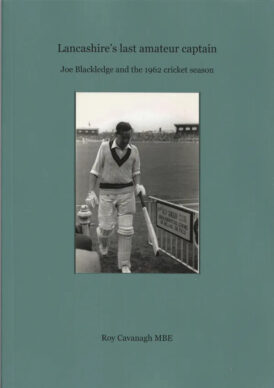Lancashire’s Last Amateur Captain
Martin Chandler |Published: 2025
Pages: 46
Author: Cavanagh, Roy
Publisher: Red Rose Books
Rating: 3.5 stars

In 2025 those charged with running Lancashire County Cricket Club are not popular with many of the county’s supporters. It would have been much the same 63 years ago when, for the last time, county cricketers were divided into two camps. By then the overwhelming majority were professional players, but there were still a few gentlemen amateurs to be found.
Historically county captains were amateurs. That had been changing, increasingly so since the end of the Second World War and even Lancashire had, in 1954, appointed a professional captain. When Cyril Washbrook retired in 1960 they turned to a young amateur, Bob Barber, who led the side for two summers.
In his first season in charge Barber led the Red Rose to runners-up spot, but a fall to 13th in 1961 was not good enough. Barber was an England player but, whilst he was touring India and Pakistan with England in 1961/62, the committee decided to replace him for the summer of 1962.
The man who got the job was a 33 year old Chorley businessman, Joe Blackledge. A good club level batsman a decade previously Blackledge had enjoyed some success in the county’s second eleven, but when he led Lancashire out against Glamorgan at Cardiff Arms Park on 2 May 1962 he was making his First Class debut.
Setting the tone for the summer Lancashire lost, but on a personal level Blackledge’s 33 and 68 were a good start. Sadly however he never passed fifty again, and ended up with 569 runs at 15.37. For his team there were another 15 defeats, and just two wins to set against them in 32 Championship fixtures. The Red Rose finished 16th out of 17, an ‘achievement’ they have since emulated, but in 1962 it was their worst ever finish.
The sub-title of this monograph is Joe Blackledge and the 1962 Cricket Season, and it is no surprise that Cavanagh, after looking at how the captaincy passed to Blackledge in the first place, then gives a full account of the season that followed before closing with some brief biographical details of 14 of the 23 men who played for Lancashire the summer, and then finally the main statistics.
To anyone with an interest in the history of Lancashire cricket this is a valuable account, although if pushed I will express a couple of disappointments. Whilst all bar one of the senior members of that summer’s Lancashire side have now departed this mortal coil the thoughts of the one survivor, Barber, and one or more of the handful of youngsters who appeared later in the season would have been interesting. I would also have liked to see at least some account of the rest of Blackledge’s life. A successful businessman he eventually sold the family company to his nephew, former England Rugby Union captain Bill Beaumont.
But then Cavanagh’s monograph does not purport to be a biography so it would be unfair to judge it on the basis of anything other than what the title and sub-title promise, and in that respect it has done very well. Lancashire’s Last Amateur Captain is available at £10 inclusive of UK postage from the publisher. There is also a signed limited edition of 16 hardbacks, which cost £28. For Lancastrians in the southern hemisphere I anticipate a few copies will be on their way to Roger Page.






Leave a comment